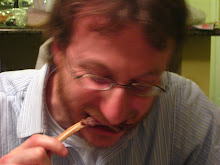 The leaning tower of venison tartare. Au Pied de Cochon inspired, NYT recipe consulted for a basic outline. While I normally eschew the mold, this was begging for it, and I had an empty chipotle can laying around.
The leaning tower of venison tartare. Au Pied de Cochon inspired, NYT recipe consulted for a basic outline. While I normally eschew the mold, this was begging for it, and I had an empty chipotle can laying around.This couldn't have been simpler. Diced venison mixed with chopped parsley and a quick sauce made of egg yolk, olive oil, hot sauce (not enough to pick it out of the end product), minced shallot, minced capers (rinsed salt cured ones), salt, pepper, Dijon mustard, and lemon juice. The sauce was whisked together before being added to the meat, and came together like a loose mayonnaise. After everything was mixed together I adjusted the seasoning (it took a good deal of salt) and let it hang out in the fridge for about 10 min. I threw some bread that was drizzled with olive oil on a ridged griddle and that was it. Really nice.
The venison came from a deer taken two days ago. The deer lived in farm country and had a stomach full of corn and soy beans. Maybe not the hippest things to grow these days (although once Vilsack gets settled in it'll be a wonder if anyone grows anything else--Salazar doesn't look too good either; not quite the change I voted for. I can't believe there's not more outrage. Sorry about that rant.), but it results in a tasty animal. Also, the animal was dispatched with a shot through the back and died instantly, making the meat that much better.
And the beer, Blond Bombshell from Indigo Imp, a small brewery that just started selling beer on Cleveland's east side. The beer is easy drinking but not boring. It's definitely got a craft thing going on, maybe from the open fermentation? Either way, the more food and drink businesses in the area the better, and hopefully they'll find success in what seems to be an ultra competitive craft beer market.
Raw meat. Bread. Beer. Can't ask for much else.





5 comments:
Thanks for the info on the Indigo Imp brewery, I didn't know a new brewery opened up on the East Side.
Rant away CFT .. I did! This is not change, but more of the same :(
Glad to oblige Adam.
OHMom. I couldn't agree more. It's a shame.
Have to disagree with the rant. American agribusiness feeds the world. If everyone cast away their plows, fertilizer , sprays, and efficient model of food production MANY people would starve. There is a wonderful market for organic , local, small farms, but the world needs cheap American food. A yes to extream liberal farming changes is a vote for mass starvation. Even if enough food could be produced, most of the world would not be able to afford the new higher prices. Local droughts would equal local death. Not a model I wish to return to.
I appreciate the alternate view. Here's my 2 cents on your comment.
American agribusiness feeds the world == there's a lot of starvation in the world, so if that's the goal of our agribusiness we're woefully unsuccessful. The world can be taught to feed themselves, at least in large part.
If everyone cast away . . . == I'm all for plows, sustainable fertilizer (organic farmers usually "fertilize"), and efficiency. I agree that many small farmers are super inefficient (and, sadly, I bet the carbon footprint for a tomato from my community garden plot is the same or worse than if I bought a coventional tomato), but look at French intensive gardens and victory gardens--they're incredibly efficient. And I've seen some amazing small farms.
The world needs cheap American food == lately it looks like American needs the world's (or at least South America's)cheap food. Everyone needs to take care of their own food supply, at least primarily. And with gas bound to rise, shipping food is likely to cost a bundle. Think of the past summer, when there was nearly price parity on veggies between supermarkets and the farmers markets.
A yes to extreme . . . == I don't agree, and I'm not sure what "extreme liberal farming changes" is. The current model pays many landholders not to farm and therefore not to put food into the market place. How does that help starving people? Smarter regulation could insure land is put to the highest use rather than used to regulate the price of commodity food.
Most of the world couldn't afford the cost of good food == again, I think a lot of places can take care of themselves, particularly if they are not reliant on seed, ferts, and equipment from big US agribusiness. There is the issue of GM seeds needing less chemicals and mabye being useful in certain situations, but that's another issue that I'm not addressing here.
Local droughts would equal local death == again, people are starving with the status quo. No policy, no matter how liberal, would forbid providing a hand to people in need. There are always emergencies and a change in food policy does not mean there wouldn't be excess that can be used to help out in those situations.
Not a model I wish to return to == I'm not talking about returning to anything backwards, but instead would like to go forwards. The rant was to say there is room for improvement. The people Obama chose are unlikely to bring that improvement.
Post a Comment